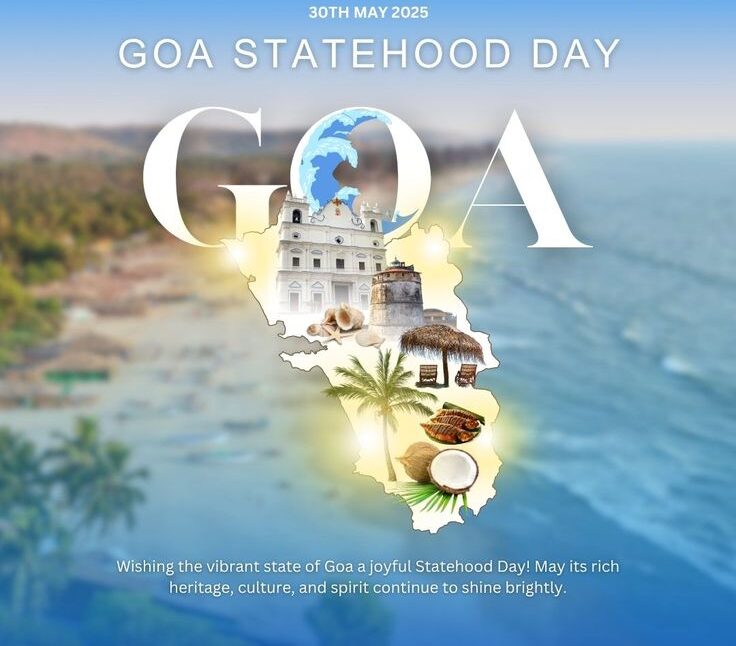🇮🇳 Goa Statehood Day: A Glorious Chapter in India’s Democratic Legacy
When one thinks of Goa, images of golden beaches, historic churches, vibrant festivals, and mouthwatering cuisine might come to mind. But behind its scenic beauty lies a profound political milestone—the day it became a full-fledged state of India. That day is celebrated annually as Goa Statehood Day, observed on May 30th.
- 📜 History of Goa Statehood Day
- 📅 Timeline of Key Events
- 🌟 7 Powerful Facts About Goa Statehood Day
- ❓ FAQs About Goa Statehood Day
- ❓ Why is Goa Statehood Day celebrated on May 30?
- ❓ What is the significance of Goa Statehood?
- ❓ How is Goa different from other states?
- ❓ What happened in the 1967 Opinion Poll?
- 🎉 How Goa Statehood Day Is Celebrated
- ✨ Wishing Messages for Goa Statehood Day
- 🎯 Why Goa Statehood Day Matters in Our Lives
- ✅ 1. Democracy Works
- ✅ 2. Cultural Identity is Power
- ✅ 3. Unity in Diversity
- ✅ 4. Small States, Big Impact
- 💼 Importance of Goa Statehood in Indian Society
- 🧑🏫 Educational and Civic Lessons from Goa Statehood Day
- 🧠 Important Points to Remember
- 🌍 Impact on Daily Life
- ✍️ Conclusion: More Than Just a Date – A Legacy of Pride and Democracy
- 📣 Final Words
It marks the transformation of Goa from a Union Territory to the 25th state of the Indian Union in 1987, and is remembered with great pride and cultural enthusiasm.
In this article, we explore the history, timeline, significance, observance, facts, daily life impact, and the emotional value of Goa Statehood Day in a heartfelt, easy-to-understand manner.
📜 History of Goa Statehood Day
Pre-1961: Goa was a Portuguese colony for over 450 years, until India liberated it in 1961 through Operation Vijay.
1961–1987: Goa functioned as a Union Territory, along with Daman and Diu.
May 30, 1987: After years of demand for self-governance and recognition of its unique identity, Goa was granted statehood and became the 25th state of India.
This moment marked a major political victory for Goans, as they were now empowered with their own legislative assembly and increased representation in national affairs.
📅 Timeline of Key Events
| Year | Event |
|---|---|
| 1510 | Portuguese colonization of Goa begins |
| 1947 | India gains independence from British rule |
| 1961 | Goa is liberated from Portuguese rule |
| 1967 | Goa votes in a plebiscite to remain a Union Territory (not merge with Maharashtra) |
| 1987 | Goa becomes the 25th state of India on May 30 |
| 2022 | Goa celebrates 35 years of statehood |
🌟 7 Powerful Facts About Goa Statehood Day
Goa is the only former Portuguese colony in India to become a state.
It retained its unique cultural identity and official language (Konkani) post-statehood.
Goa is India’s smallest state by area but among the most literate.
The push for statehood was rooted in protecting Goan culture, autonomy, and governance.
May 30 is declared a public holiday in Goa, with government programs, awards, and parades.
The state was formed without merging with another region, showcasing a peaceful democratic success.
The Konkani language was recognized in the Eighth Schedule of the Indian Constitution after Goa’s statehood.
❓ FAQs About Goa Statehood Day
❓ Why is Goa Statehood Day celebrated on May 30?
It marks the day in 1987 when Goa became a full-fledged state of India, after being a Union Territory for 26 years.
❓ What is the significance of Goa Statehood?
It empowered Goa with legislative autonomy, representation in Parliament, and allowed it to preserve its identity as a culturally rich state.
❓ How is Goa different from other states?
Goa retains a Portuguese-influenced heritage, Roman Catholic majority, unique land laws, and a strong sense of local pride in its traditions.
❓ What happened in the 1967 Opinion Poll?
Goans voted not to merge with Maharashtra, choosing to retain their independent identity—a rare example of democratic decision-making.
🎉 How Goa Statehood Day Is Celebrated
The day is a public holiday in Goa, and is marked with:
Flag hoisting ceremonies
Cultural performances showcasing Goan music, dance (like Fugdi, Dekhni), and traditions
Award ceremonies to honor local heroes, artists, and community leaders
Government addresses by the Chief Minister and Governor
Patriotic songs, local parades, and school events
Special Konkani theatre and folk plays
Communities celebrate with unity, pride, and cultural flair—reminding everyone of the journey from colonial rule to sovereign empowerment.
✨ Wishing Messages for Goa Statehood Day
🇮🇳 “Wishing all Goans a joyful and proud Goa Statehood Day! Let’s celebrate our rich history and identity.”
🥳 “May the spirit of Goa shine brighter each year. Happy Statehood Day to the land of joy and diversity!”
🌺 “From our beaches to our ballots, Goa shows the world how heritage and democracy go hand in hand. Happy May 30th!”
🕊️ “Here’s to the land that chose unity over division and identity over merger—Happy Goa Statehood Day!”
🎯 Why Goa Statehood Day Matters in Our Lives
Even if you’re not from Goa, there are important life lessons this day teaches:
✅ 1. Democracy Works
The peaceful decision to grant Goa statehood shows how public will and democratic processes can shape a region’s destiny.
✅ 2. Cultural Identity is Power
Goa stood firm in preserving its language, traditions, and lifestyle—and was rewarded with autonomy.
✅ 3. Unity in Diversity
Though diverse in faiths and cultures, Goans united for a common cause, proving the strength of community.
✅ 4. Small States, Big Impact
Though small, Goa continues to lead in literacy, tourism, environment, and civic awareness—an inspiration for many other regions.
💼 Importance of Goa Statehood in Indian Society
Goa’s statehood symbolizes:
Empowerment of smaller regions
Respect for cultural and linguistic identity
The importance of local governance
Strengthening federalism in India
Decentralized development that respects history and progress equally
Goa today enjoys a vibrant democracy with active civic participation, high literacy, and global appeal—all of which stem from its statehood foundation.
🧑🏫 Educational and Civic Lessons from Goa Statehood Day
Civics classes use Goa as a case study for federalism and democratic decision-making.
Legal students study the unique land ownership laws of Goa, rooted in Portuguese influence.
Language activists celebrate the inclusion of Konkani in India’s official languages.
Environmentalists point to Goa’s community-driven efforts to protect its land and coastline as a model.
🧠 Important Points to Remember
Goa gained statehood on May 30, 1987.
It was the 25th state of India.
Konkani is the official language.
It was a Portuguese colony until 1961.
Goa refused to merge with Maharashtra in 1967 via a public vote.
Celebrated with cultural events, awards, and patriotic fervor.
🌍 Impact on Daily Life
🌞 In Goa:
Statehood brought greater autonomy in decisions affecting education, employment, tourism, and infrastructure.
Policies specific to Goan needs became easier to implement.
It boosted state pride, particularly among the youth and educators.
🏛️ Across India:
Served as a blueprint for future state formation demands.
Inspired federal fairness, with Delhi and other UTs citing Goa’s model.
Enhanced the recognition of diverse linguistic and ethnic identities within India.
✍️ Conclusion: More Than Just a Date – A Legacy of Pride and Democracy
Goa Statehood Day isn’t just a local festival—it’s a symbol of democratic empowerment, cultural dignity, and national unity. From its colonial past to its vibrant present, Goa’s journey shows us that identity and integration can coexist beautifully in a diverse nation.
As we celebrate May 30 every year, let it remind us that every region, no matter how small, has the right to its voice, culture, and governance.
📣 Final Words
So the next time you see the shimmering beaches or hear the soulful sound of Konkani music, remember—you’re witnessing a land that fought and won its right to self-govern. That’s not just history—it’s living inspiration.
Happy Goa Statehood Day! Jai Goa, Jai Hind! 🇮🇳








